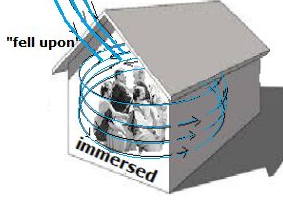
LEAVING THE DOCTRINE OF BAPTISMS 16:3
What Is The Baptism Of The Holy Spirit?
“The Spirit Falls Upon”
The Use Of The Special Definite Article "THE" In The Original Greek Language Is Very Important. Therefore, I have written a
list of passages in which its presence with "faith"is not translated into the English.
Go To List of "THE Faith" passages.
Synonyms. Expressions such as synonyms are not required to fit in every scenario. “A sunset might be described equally well as beautiful or resplendent, but a beautiful baby would not usually be described as resplendent, which has a different implication (e.g., dazzling).”i
Five Expressions For “The Baptism Of The Holy Spirit.” Two have been covered; a continuation -...
1. Immersion (previous article) a
2. Immersion of Sound. a
3. A Falling Upon.
4. A Pouring Out Upon.
5. A Gift.

#3. Holy Spirit Baptism is (THE SPIRIT) FALLING UPON.
“Falling Upon” the Gentiles is the expression used for the baptism in the Holy Spirit in Acts 10 and 11 for the Cornelius household’s baptism. A few years had passed since the apostles were baptized by the Holy Spirit on Pentecost in Jerusalem. A religious Gentile soldier Cornelius living in Caesarea was told by an angel to “Send men to Joppa, and call for Simon, whose surname is Peter; Who shall tell thee words, whereby thou and all thy house shall be saved” (Acts 11:13,14). Cornelius did as he was told; he sent for Peter; and he assembled his kin and friends to hear Peter’s words “whereby they could be saved.” In Acts 10 we have this record, “While Peter is yet speaking these sayings, the Holy spirit fell upon all those hearing the word” (Acts 10:44, Young’s Literal Translation).ii
“Falling Upon” the apostles also. Peter described it later to the other “apostles and brethren” at Jerusalem (11:1), “And as I began to speak, the Holy Spirit fell upon them even as upon us also at the beginning.” (Acts 11:15, Darby; cf. Acts 10:44 and 11:15). Both occurrences of the baptism of the Holy Spirit was a “Falling Upon.”
The “falling upon” is distinct from Peter’s preaching. Note why Peter was there to preach: “And now send men to Joppa, and call for one Simon, whose surname is Peter: … he shall tell thee what thou oughtest to do” (Acts 10:5,6). Also the words of Peter were “words whereby they could be saved” (Acts 11:14). The assembly had only started listening without being told to do anything; yet God baptized them by the Holy Spirit. Peter would continue preaching and tell them they had to be baptized in water (10:48). These words would tell them (1) what to do and (2) how to be saved. These were two different baptisms; the required baptism to be done and obeyed in order to be saved was in water. “For after that in the wisdom of God the world by wisdom knew not God, it pleased God by the foolishness of preaching to save them that believe” (1 Corinthians 1:21). Heaven’s “baptism of the Holy Spirit” obviously had another purpose.
Meanwhile, the “falling upon of the Holy Spirit” caused the recipients to “speak with tongues, and magnify God.” As we remember this occurred also with the baptism of the Spirit upon the apostles in Acts 2:4. “And they … began to speak with other tongues, as the Spirit gave them utterance” (ASV).
This expression “Spirit fell upon” is equivalent to an OT expression that indicated that one was being inspired to be God’s mouthpiece, spokesman; i.e., a prophet (Exodus 4:16; 7:1). The prophet Ezekiel said, “And the Spirit of the LORD fell upon me, and said unto me, Speak” (Ezekiel 11:5). When God “placed” His Spirit upon Moses, or the Seventy, or King Saul, or David (1 Samuel 16:13), etc., they would prophesy.iii The Spirit’s coming or falling upon individuals then made them prophets to speak for God. In the case of King Saul (e.g., 1 Samuel 10:10), it was definitely temporary.
 Although
this expression “fell upon” proves
to
be a synonym for the
baptism of the Holy Spirit,
it is NOT
limited to such. Remember Webster
(in part one)
defined a synonym as an expression
that’s “nearly
the same meaning in
some
senses”.
“To
fall upon”
cannot
be said to exclusively refer to an immersion since the Samaritan
believers were said to “not
having had the Spirit fall
upon them” (Acts
8:16) which matter was resolved
not
by
baptism
of the Holy Spirit but simply
by
the laying on
of the apostles’ hands
(Acts
8:17,18). When Paul laid
his hands
on the disciples in Acts 19:6 “the
Holy Spirit came*
(up)on them; and they
spake
with tongues, and prophesied.”
This would mean that this “falling
or
coming
upon” is acquired directly
in the baptism of the Holy Spirit but was
available also
indirectly through the means of the Spirit-baptized
apostles with the laying
on of their hands.
[There’s no record of this happening with the Gentile
Spirit-baptized
ones.]
Although
this expression “fell upon” proves
to
be a synonym for the
baptism of the Holy Spirit,
it is NOT
limited to such. Remember Webster
(in part one)
defined a synonym as an expression
that’s “nearly
the same meaning in
some
senses”.
“To
fall upon”
cannot
be said to exclusively refer to an immersion since the Samaritan
believers were said to “not
having had the Spirit fall
upon them” (Acts
8:16) which matter was resolved
not
by
baptism
of the Holy Spirit but simply
by
the laying on
of the apostles’ hands
(Acts
8:17,18). When Paul laid
his hands
on the disciples in Acts 19:6 “the
Holy Spirit came*
(up)on them; and they
spake
with tongues, and prophesied.”
This would mean that this “falling
or
coming
upon” is acquired directly
in the baptism of the Holy Spirit but was
available also
indirectly through the means of the Spirit-baptized
apostles with the laying
on of their hands.
[There’s no record of this happening with the Gentile
Spirit-baptized
ones.]
Since this is true, the death of the Spirit-baptized apostles would mean the cessation of laying on of their hands, and thereby, the power of prophecy (unless the Spirit baptism continued, which it didn’t).iv
Cessation of “Falling Upon” When Revelation Complete. This is what Paul meant when he wrote, “For what we know is incomplete and what we prophesy is incomplete. But when what is complete comes, then what is incomplete will be done away with” (1 Corinthians 13:9, 10, ISV). What was incomplete and complete in this text? Not Jesus. Was it not the knowledge and the prophesying? We would conclude that there is to be no more additions to knowledge when knowledge revelation became complete. Then there also would be no more prophesying. When the last apostle died, the “words” (called "the Faith", Jude 3, "which was once delivered"; see Extra Study) for us to believe and obey would have been delivered completely.
Summary.
The baptism of the Holy Spirit is an immersion.; it is an immersion of Sound similar to that of a mighty wind; and it is a falling of the Holy Spirit “upon.” The only verified recipients revealed to us are (1) the apostles at the beginning of the gospel on the Pentecost after the cross event (Acts 2) and (2) Cornelius household at the beginning of Peter’s preaching in Acts 10. Peter compares the Cornelius baptism of the Spirit to the one “at the beginning.” Only two occurrences of reference.
To be continued ...
GAYLON WEST
Throw Out The Lifeline
ihttp://www.dictionary.com/browse/synonym/
ii “To fall upon” and “came upon” is used also with the laying on of hands of the apostles (Acts 8:16;19:6).
iii King Saul prophesied from both an evil spirit falling upon him (1 Samuel 18:10) and the God’s Spirit springing on him (1 Samuel 10:10). The Spirit comes upon David (1 Samuel 16:13). Moses and the seventy had the Spirit placed upon them (Numbers 11:17, 25, 26,29) and they prophesied, etc. According to the concordance each prophet is generally said to have the Spirit of God upon.
iv Remember only two occasions of the baptism of the Holy Spirit is made known: upon the apostles (Acts 2) and upon the Gentiles (Acts 10, 11).

|